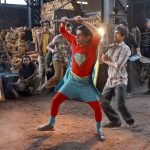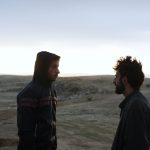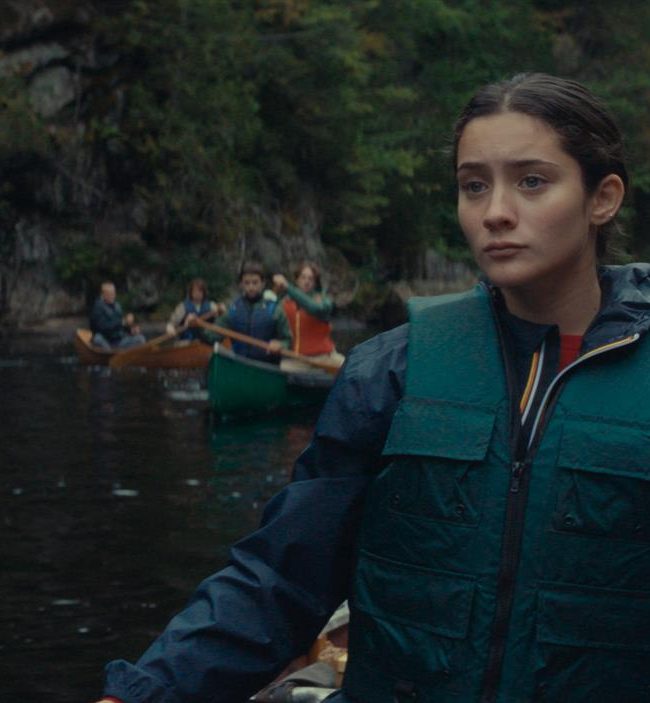A Conversation with Philippe Lesage (WHO BY FIRE)
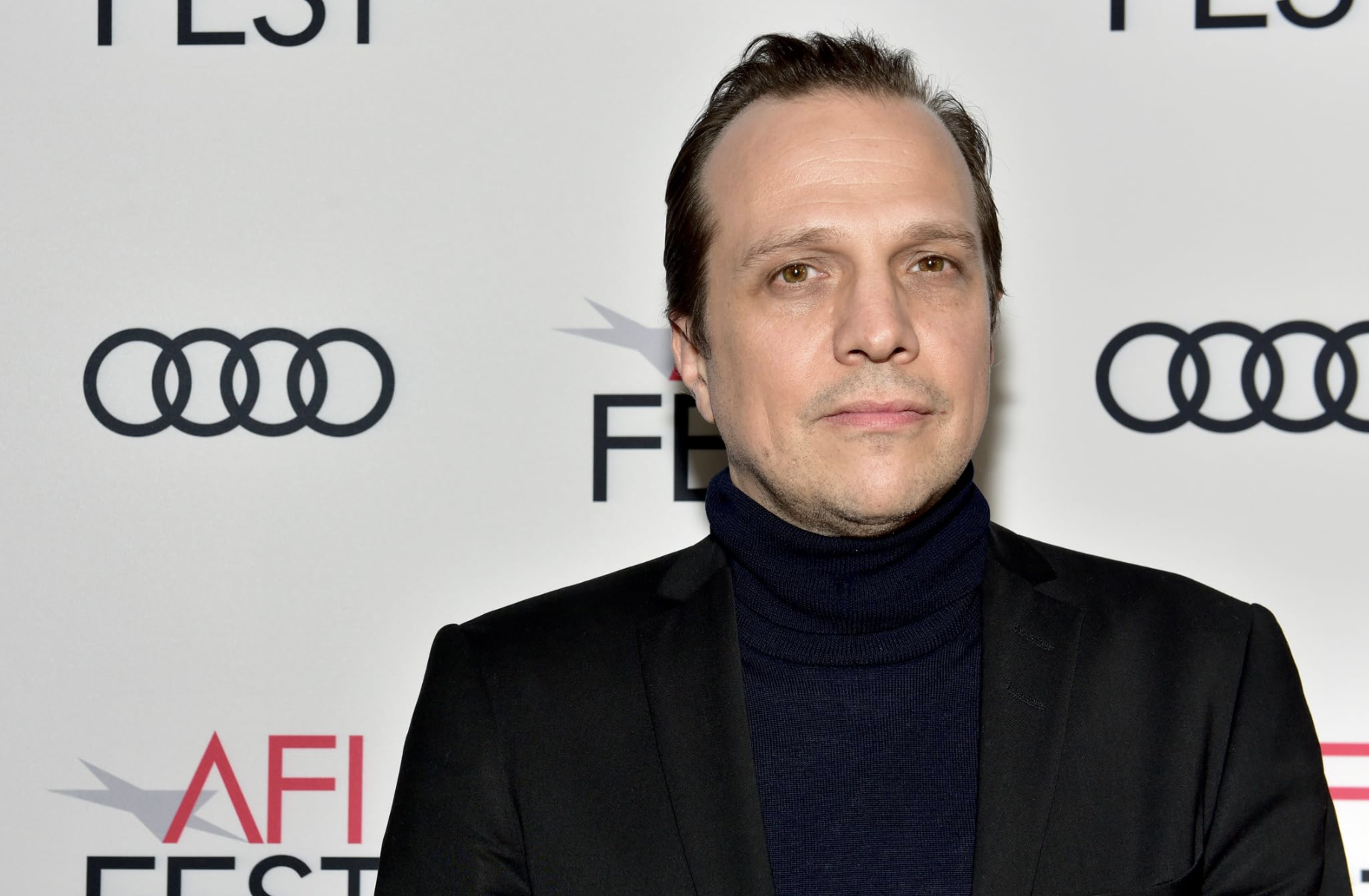
Philippe Lesage’s Who By Fire continues the French-Canadian filmmaker’s nuanced exploration of coming-of-age themes, but with a darker, more psychologically complex edge. Following his acclaimed films The Demons (2015) and Genesis (2018), Lesage’s latest work examines the perilous dynamic between youth and authority in the isolated setting of a wilderness lodge.
The film, which premiered at the 2024 Berlinale Film Fest and won the top jury prize in the Generation 14plus section, follows 17-year-old Jeff (Noah Parker) as he travels to the remote cabin of acclaimed director Blake Cadieux (Arieh Worthalter). Jeff arrives with high expectations—Blake is an artist he admires, and the trip offers proximity to Aliocha (Aurélia Arandi-Longpré), his friend’s sister with whom he’s secretly in love. What unfolds is a tense, beautifully observed study of masculine ego, artistic pretension, and the disillusionment that comes when meeting one’s idols. Working with cinematographer Balthazar Lab, Lesage crafts a visually striking atmosphere where the wilderness mirrors the characters’ emotional terrain. Through methodical pacing and masterful ensemble performances, Who By Fire reveals the subtle power dynamics between generations. It was great to speak with Philippe in the following conversation edited for length and clarity.
Hammer To Nail: The film explores the danger of idolizing artists, through Jeff’s admiration of Blake. How has your perspective on mentorship in filmmaking evolved since your own early career?
Philippe Lesage: I was lucky to have great teachers growing up. They gave me tons of curiosity. The same thing happened in university. I had a teacher who was very encouraging with my creative writing. That gave me a lot of confidence as a writer. That is so important for filmmaking. In the film world though, I cannot say I had a mentor. I did not know anyone when I started in Denmark. I really started from scratch which is why I did my own documentaries and did everything on those films. I think the older someone gets, the more power they want, and the more they view the young/talented as a threat. When I was introduced to older people in the film world as a young filmmaker, nothing ever came of it.
I never was one to reach out to my favorite directors. Most of them were dead already, however, even those that were alive, I never wanted to because I was afraid I would be disappointed. Now that I am almost a middle aged man, I have young filmmakers approaching me more and more. I try to be as nice and supportive as I can. I was on a film festival jury recently with a very nice Greek director who teaches as well. She told me about all her mentees and I could feel how much she cared about them. It was very inspiring to me.
HTN: Both Aliocha and Jeff are creative aspirants – she through writing, he through film. What interests you about portraying young artists discovering their voice?
PL: The only one of them doing something artistic is Aliocha haha. Jeff is more dreaming about it than doing it concretely. It’s part of being young. It starts with wanting to be something you are not and imitating. To see yourself as a director, when you don’t have any films in your resume and you’re just pretending…It’s not a great first step. When I was young, I knew I wanted to make films, but I studied literature. I was already a huge cinephile, but I wanted to force myself Into reading. If you want to be an interesting auteur, and you are only watching other films, you are not interested in other art forms, if you do not have that curiosity, I do not know what you are going to tell. It is probably not going to be that interesting.
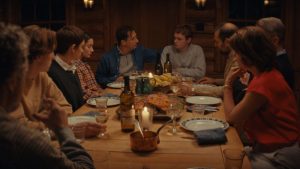
A still from WHO BY FIRE
My first script ideas were terrible. It was an impression of the last film I had seen that I liked. That’s not having a personal voice, but that’s ok! It’s a start. There are many first films of famous directors that are just rip offs of other films. I started making films when I was a bit older, so I feel like I saved myself from that phase.
HTN: There are three dinner scenes that are pivotal to the film. Why are shared meals such effective settings for exploring family and power dynamics?
PL: Crafting a good dinner sequence is difficult. Driving far from the city, to a cold place, completely isolated…these things are not attractive to me as a person. I did everything I could to put myself in uncomfortable situations. Making a dinner scene was a challenge. I do not like to cut too much, as you can see, I like long shots. Dinner scenes are particularly challenging when you do not cut. It is a place where everyone must be seated and forced to listen to each other speak. It works well as a microcosm for society. The different generations forced into the same space. Sharing a dinner with someone can be very intimate. I don’t like being isolated in some stupid cabin, however, I do like to meet people over dinner. You get to know someone very quickly over a meal with good bottles of wine. Even the people who do not like the film like the dinner scenes haha, so, I think I succeeded. Acting wise it is a huge challenge, but the pay off is immense. To force people to remain in the world for such long takes, it gives their performance a lot of energy.
HTN: The story takes place in a time before phones and constant connectivity. Was this temporal setting crucial for the kind of isolation and tension you wanted to create?
PL: I am maybe subconsciously nostalgic for the era that I grew up in. I lived all of my teenage years without the internet. Maybe I am old school, however, when I see a film that focuses too much on the technology of today, I feel it ruins the romanticism. It is going to look so stupid 10 years from now. Technology is moving so fast. I am afraid that these films will age very badly. Humans still deal with the same issues that Jeff and Aliocha deal with. Whether they have phones or not, they love in the same way and hurt in the same way. For that reason, I prefer to be imprecise on my times and will continue to do so.
HTN: The sequence up on the rocky mountain where we have this confrontation between Jeff and Blake, it’s a heartstopping moment and plays out in a fascinating way. Talk about shooting that scene and your thinking?
PL: It is one of my favorite sequences in the film. Blake is so far in Jeff’s head. Blake is a subtle manipulator. He slowly destroys Jeff psychologically. Jeff knows Blake is a dangerous and powerful rival. Jeff is going crazy, he feels weak and frustrated. This turns into a want to kill. He really thinks about killing Blake. It would have been stupid if he actually killed him. He is not completely insane. The gun does not work and Blake notices. He uses this moment to confront and scare Jeff. It’s all done in complete silence which I love. This explains what goes on in the river afterwards. All these mistakes that are made in the water is because Jeff is completely shaken. Jeff is crying in the Canoe and Blake is behind him not saying a word. He stays like marble; no emotion. It’s a moment that shows the true nature of both characters.
– Jack Schenker (@YUNGOCUPOTIS)




